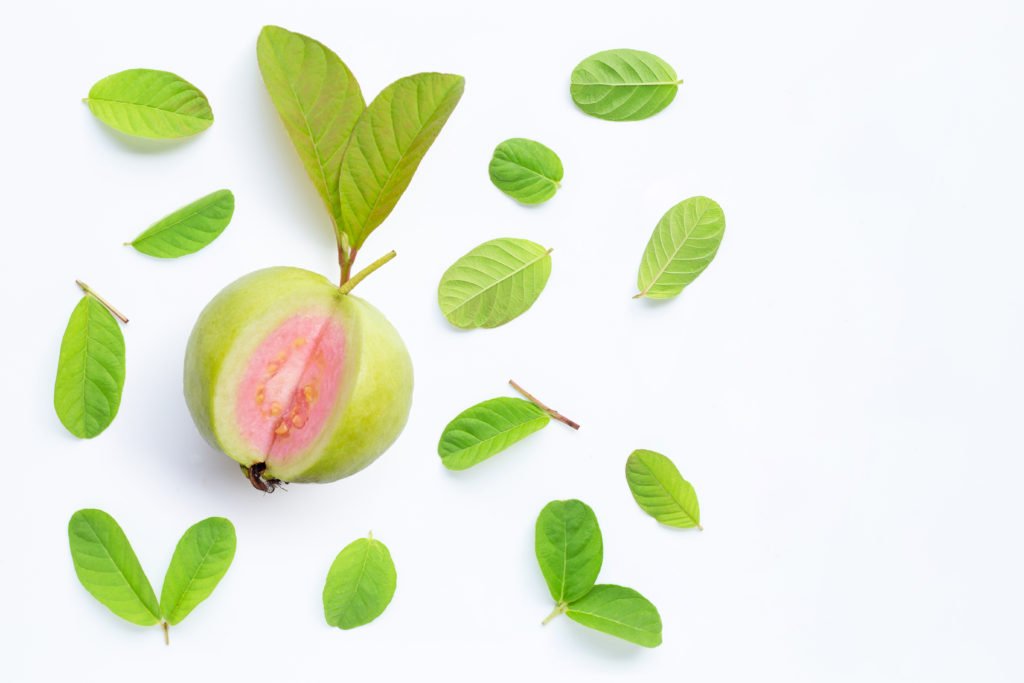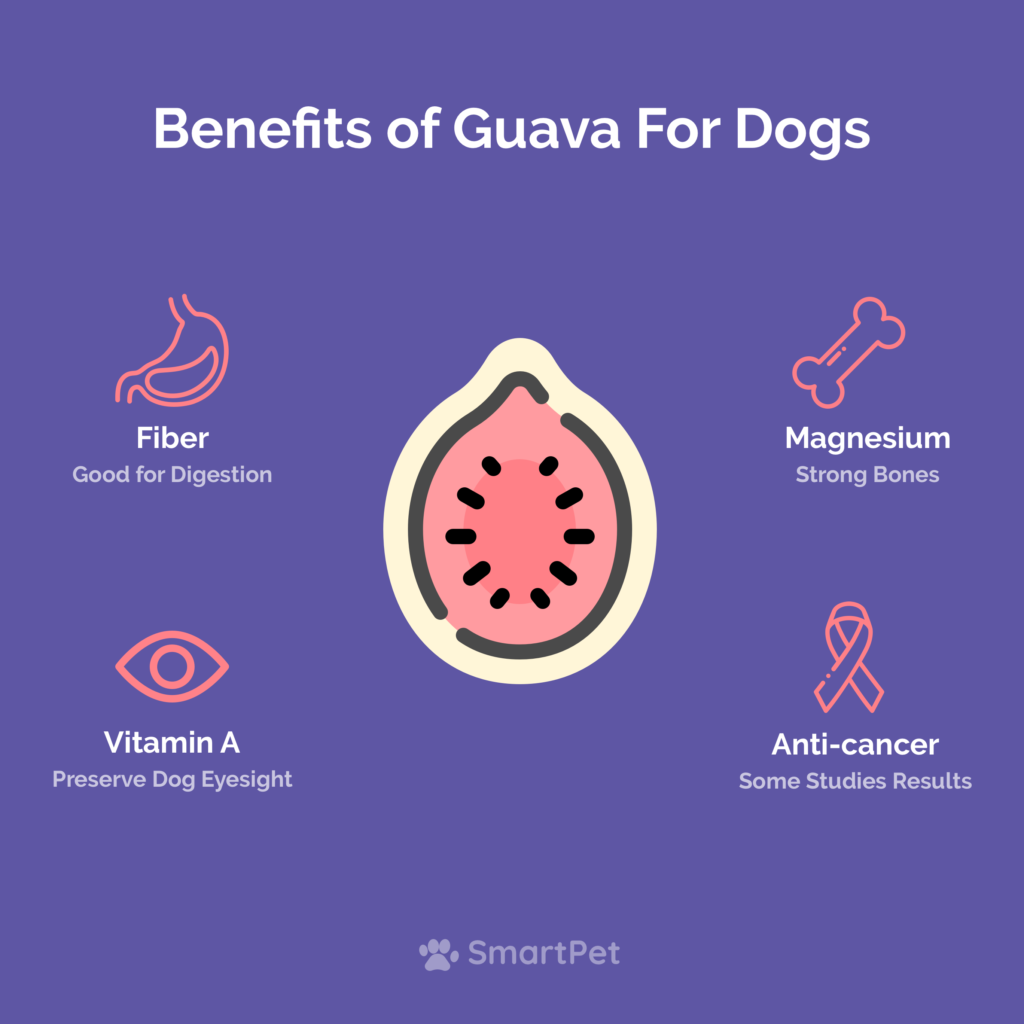Can Dogs Eat Guava?
If you’re like many people who own dogs, you’ve probably looked at something in your fridge and wondered if your dog could eat it. I know that after I went to the supermarket and picked up several fruits and veggies, I sat down and searched to see if I could share them with my furry family members. Pears and apples received an obvious yes, in small amounts, but what about guava? So, can dogs eat guava?

The Short Answer to Can Dogs Eat Guava
Dogs can eat guava, and they might relish it as a super sweet treat.
If you choose to feed a bit of guava to your pup, you’ll want to limit the amount because too much can upset your dog’s stomach. This fruit is relatively healthy and even features several important benefits, such as promoting heart health. When feeding it, you’ll want to consider the extra calories it contains (which are less than many other fruits), but which may increase your dog’s chance of gaining weight or developing issues such as diabetes.
If your dog has a health condition, you should definitely talk to your veterinarian before you offer them any guava. While small amounts are usually okay, it could interfere with your pet’s health if they are diabetic or on certain medications.
Guava
Guava is an exotic fruit that grows on a small tree, usually only up to about 30 feet high. The tree is famous for its attractive appearance, with copper colored bark that can flake off easily and expose the greenish colored layer of the tree beneath its bark. It produces small, white flowers that are associated with the fruit.
The fruit of the guava tree can be round, oval, or even pear-shaped, and it features a light yellow skin when mature, although it may have a pink tinge to it. The flesh can range in color, from being white to a dark pink or deep red, and the central pulp tends to be darker in color. The fruit does have seeds, although some types have chewable seeds or are nearly seedless. It makes for a sweet treat when eaten.
Benefits of Feeding Guava
Guava has numerous health benefits, largely related to the vitamins and minerals that it contains. It is rich in fiber, like many fruits and vegetables, which can help to regulate your dog’s gastrointestinal tract. Feeding a small amount of guava will give a little fiber boost to your pup, which can help him express his anal glands, regulate bowel movements, and produce a firm stool.
Guava also contains a variety of different vitamins, including vitamin C, which is an important vitamin. Dogs don’t need to get this in their diet, as they can produce it themselves, but it can help their immune system function optimally and help keep them from getting sick.
Guava is also a good source of vitamin A. This vitamin helps preserve your dog’s eyesight. It can also be associated with sleeker, healthier coats. Guava is also a source of vitamin K. Both vitamins A and K are useful in producing adequate levels of red blood cells, while vitamin K also helps to regulate blood clotting mechanisms.

Guava contains minerals that are also helpful to your dog. Potassium and magnesium are minerals that have a number of benefits. Potassium is used by many cells for cell-to-cell signaling. It promotes good digestion, especially when coupled with the high amounts of dietary fiber in guava.
The fiber and potassium levels of guava have also been linked to heart health in people, so it stands to reason that it may help your pooch. The antioxidants found in the fruit may also provide some protection against free radical damage, and guava leaf extract has even been linked to lower blood pressure and lower levels of cholesterol, more ways in which guava may promote heart health.
Both potassium and magnesium are important for strong bones, and having high enough levels of magnesium will help your dog’s body absorb potassium. Magnesium is also useful in helping absorb other nutrients, including zinc.
In animal studies, guava has been linked to anti-cancer effects, although more research needs to be done in this venue. Guava extract has actually been shown to stop cancer cells from growing and may even be more effective than some cancer drugs.
Risks of Feeding Guava
The biggest risk of feeding guava is risk of obesity that comes in eating more than just your dog’s regular diet. It also puts your dog more at risk for developing metabolic diseases, including diabetes. The good news is that research does support that guava may help regulate blood sugar levels, which may relate to its fiber levels, but you should still feed it in small amounts.
Feeding food that contains carbohydrates can also increase the amount of fermentation that occurs in your dog’s gut. This can lead to problems such as diarrhea and painful gas. Limiting the amount of guava you feed your dog is the best way to limit their risk factors. You should also not feed it with other fruits for the first time, so if it does cause diarrhea or vomiting, you know which food caused the issues.
When feeding guava, you should only feed the central pulp portion of the fruit, removing all seeds. The seeds may contain cyanide, which is highly toxic to your dog. Seeds may also be more likely to upset your dog’s tummy and cause diarrhea.
In Summary
Guava is safe for your dog to eat, but it should always be fed in moderation. This fruit contains several important vitamins and minerals, which may improve your dog’s coat and digestive tract. Like many fruits, feeding it can lead to an imbalance in your dog’s dietary needs, which can put your dog at a higher risk for diarrhea and health issues like obesity. If you choose to feed guava, always feed it in moderation. Discuss feeding guava with your veterinarian to learn about any risks it may pose for your dog, particularly if any health issues arise.
Resources
https://dogsnsox.com/blogs/expert-advice/can-dogs-eat-guava-here-s-why-they-re-great
https://hort.purdue.edu/newcrop/morton/guava.html
https://www.dogster.com/lifestyle/exotic-fruits-dogs-can-eat-tropical-fruits-month-acai-pomegranate-persimmon-pineapple
https://www.healthline.com/nutrition/8-benefits-of-guavas
Read More Articles
Subscribe
Subscribe to receive latest news and articles from us.



